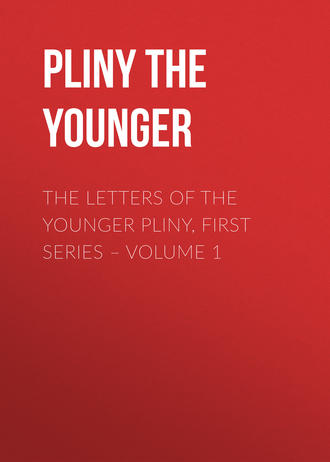 полная версия
полная версияThe Letters of the Younger Pliny, First Series – Volume 1
5.XIX.—TO PAULINUS
I notice how kindly you treat your servants, so I will be quite frank with you, and tell you with what indulgence I treat mine. I always bear in mind that phrase in Homer, "like a father mild," and our own Latin phrase, "father of his family." Even if I had naturally been of a harsher and less genial disposition, the weakness of my freedman Zosimus would melt my harshness, for one has to show him greater kindness just in proportion as he needs it more at his time of life. He is an honest fellow, devoted to his duties and well-educated, but his chief accomplishment and, so to speak, his particular recommendation is his skill in playing comedy, in which he is really admirable. For his delivery is sharp, intelligent, to the point, and even graceful, and he plays the harp much better than is usually expected from a comedian. He is also so clever in reading speeches, history and poetry, that you would fancy he had never studied anything else. I have gone into all this detail to show you how many services this one man can render me, and how pleasant they are. Moreover, I have long entertained a great regard for him, which has been increased by his serious ill-health, for Nature has so arranged it that nothing fires and stimulates our affection so much as the fear of losing the object of it, and I have on more than one occasion been afraid of losing Zosimus.
Some years since, while he was reciting with great earnestness and fire, he spat blood, and I sent him on that account to Egypt, from which country he recently returned with his health restored. Then, after severely taxing his voice for days together, he was warned of his old malady by a slight cough, and once more brought up some blood. So I have decided to send him to the farm which you own at Forum Julii, for I have often heard you say that the air there is healthy, and the milk peculiarly beneficial to complaints of this kind. I should be glad, therefore, if you will write to your people to take him in at the house and give him lodging, and accommodate him with anything he may require at his expense. His needs will be very small, for he is so sparing and abstemious that his frugality leads him to deny himself, not only dainties, but even that which is necessary for his weak health. When he sets out, I will give him sufficient travelling money for one who is going to your part of the country. Farewell.
5.XX.—TO URSUS
Within a short time of their impeaching Julius Bassus the Bithynians brought a second action, this time against Rufus Varenus, their proconsul, the very man whom, in their action against Bassus, they had received permission, at their own request, to retain as their advocate. On being brought into the Senate they applied for a commission to be appointed to investigate their charges, and Varenus sought leave to be allowed to bring witnesses from the province in his defence. To this the Bithynians objected, and the matter came to a debate. I acted on behalf of Varenus, and my pleading was not without good results. I am justified in saying this, as my written speech will show whether I spoke well or badly. For in delivering a speech chance has a controlling influence on success or failure. A speech either gains or loses a good deal according to the memory, voice, and gesture of the speaker, and even the time taken in delivery, to say nothing of the popularity or unpopularity of the accused; whereas a written speech profits nothing from these advantages, loses nothing by these disadvantages, and is subject neither to lucky nor unlucky accidents.
Fonteius Magnus, one of the Bithynians, replied to me at great length, but he made very few points. Like most of the Greeks, he mistakes volubility for fulness of treatment, and they pour forth in a single breath a perfect torrent of long-winded and frigid periods. Julius Candidus rather wittily says apropos of this that eloquence is one thing and loquacity another. For there have been only one or two people who can be described as eloquent—not one indeed if Marcus Antonius is to be believed,—but scores of persons possess what Candidus calls loquacity, and loquacity and impudence usually go together. On the following day, Homullus spoke on behalf of Varenus, and delivered a skilful, powerful, and polished speech, while Nigrinus replied with terseness, dignity, and elegance. Acilius Rufus, the consul-designate, proposed that the Commission of Enquiry asked for by the Bithynians should be allowed, and said not a word about the request of Varenus, which was tantamount to proposing that it should be negatived. Cornelius Priscus, the consular, moved that the requests of both the accusers and the accused should be granted, and he carried a majority with him. The point we asked for was not within the four corners of the law and was not quite covered by precedent, but none the less it was entirely reasonable, though why it was reasonable I shall not tell you in this letter, in order to make you ask for a copy of my pleading. For if it be true, as Homer says, that "men always prize the song the most which rings newest in their ears," I must beware lest by allowing myself to go chattering on in this letter I destroy all the charm of novelty in that little speech of mine, which is the main thing it has to commend itself to you. Farewell.
5.XXI.—TO SATURNINUS
Your letter has aroused in me conflicting emotions, for part of the news it contained made me glad, and part made me sorrowful. I was glad to hear that you were detained in town, for though you say it was much against your will, it was not against mine, especially as you promise that you will give a reading as soon as I arrive. So I thank you for waiting my coming. The bad news was that Julius Valens is lying seriously ill, although even this should not sadden us, if we only think of what is best for him, for it will be much better for him to obtain as speedy a release as possible from a disease which is past all cure. No, the real sad news, or rather heartrending news is that Julius Avitus died on ship-board while returning from his quaestorship, miles away from the brother who was devoted to him, and from his mother and sisters. Those are circumstances which do not affect him now that he is dead, but they did affect him on his death-bed, and they are a great trouble to his surviving relatives, especially as he was a young man of such promise and would have reached the highest offices in the State if only his qualities had had time to ripen. And now he has been cut down in the very flower of manhood! What a keen and enthusiastic student he was, how well read, and what a number of essays he had made in writing! Yet all have perished with him and left no fruit for posterity to reap. But it is useless for me to indulge my sorrow, for if once one gives it free play, even the slightest occasions for grief are magnified into crushing blows. I will write no more, and so check the tears which this letter has made to flow. Farewell.


